In the immortal words of Blink 182, “Work sucks, I know.” It always has. But it’s only recently that we in the mainstream have begun to state this truth as plainly as Tom DeLonge.
Why should that be? For one thing, the ruthless gig economy, with its lack of long-term security, seems to encompass more and more of us. In response, we’ve quiet quit. We’re watching Ben Stiller’s Severance in the shadow of Ling Ma’s Severance, and neither seem far-fetched. The American labor movement is having a moment, but once again the organizing conditions are adverse. What’s a burned out temp worker to do?
Well, tear it all down, of course. But before we get to that—here’s what to read next if you’re finally ready to loud quit.
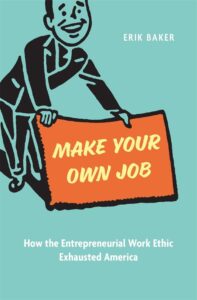
Erik Baker, Make Your Own Job: How the Entrepreneurial Work Ethic Exhausted America
Baker’s a Harvard instructor and associate editor at The Drift. His new intellectual history traces the evolution of the “entrepreneurial work ethic” in America.
In a New Yorker review of the book, Anna Wiener noted that this is no small task. “Reading Baker, you sense that the entrepreneurial work ethic, once named, can apply to any number of things: conversations about poverty or homelessness, mandates to ‘manage up,’ the meritocracy myth, children’s entertainment.” Pick this one up for a capacious explanation.
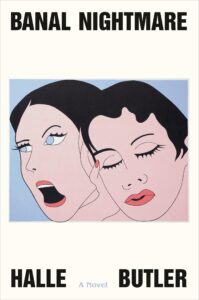
Halle Butler, Banal Nightmare
Butler is our reigning bard of burnout. And according to Nicole Flattery, the bogeyman haunting all three of her novels—Jillian, The New Me, and the most recent, Banal Nightmare—”is the careerism of the millennial.”
In a warm survey of her canon in the New York Review of Books, Flattery dubbed Butler’s novels “dread-inducing,” and praised her “sense of comic timing and her total, refreshing mercilessness. ” The satire is finely tuned in Banal Nightmare, which follows an anhedonic young woman awaiting an inheritance. But although Moddie, our hero, finds ways around the work trap, spiritual redemption doesn’t come cheap.

Heike Geissler, Seasonal Associate, translated by Katy Derbyshire
Naomi Fry called this German import—published in 2014, but translated into English four years later—a “labor memoir for the Amazon era.” Lifted from Geissler’s own experiences supplementing her freelance writing with a short-term-gig at a certain gross behemoth, this particulate memoir documents daily indignities, building to a close read of “of the entire, hidden world of the contemporary laborer.”
For an international analysis, this one pairs nicely with a more overtly political piece of embedded reportage: the late Barbara Ehrenreich’s Nickel and Dimed: On Not Getting By in America.
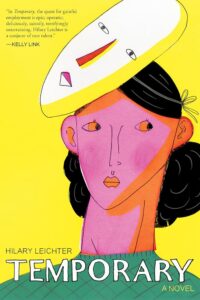
Hilary Leichter, Temporary
In Hilary Leichter’s dazzling debut, a young woman tries on 23 jobs. Each one is more surreal than the last. This is one of few books on this list to address the absurdity of our present work culture directly. The bosses here are no coffee-breathed corporate henchmen, but pirates and assassins.
As Leichter told Jordan Kisner in a 2021 episode of Thresholds, the oddity is realistic. “When I think about the world, it just tends to be a little bit upside down,” she said.
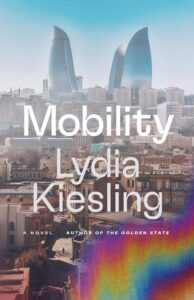
Lydia Kiesling, Mobility
Mobility traces Bunny’s passive fall into an ethically compromising job with Big Oil. This novel has an old-school structure—Kiesling drew on Upton Sinclair’s meatpacking expose, The Jungle—but I’m hard-pressed to think of another modern novel that so well captures a slide into corporate complicity.
By laying out the many forces pressing in on Bunny—culture-given hungers for prestige, security, and nice things—Kiesling draws us close to the banality of bad decisions. And shows that like so many of us, Bunny’s first crime is lacking imagination.
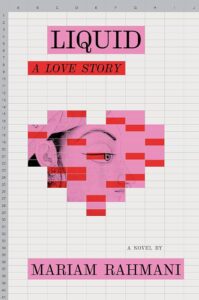
Mariam Rahmani, Liquid: A Love Story
Rahmani’s debut novel joins a canon of what I’ve called the millennial midlife crisis novel. (Our underemployed, overeducated protagonist is also a contender for the ranks of Maggie Doherty’s term, adjunct lit.)
Though unsparing and wry like its bedfellows, Liquid is also pleasingly buoyant. Our hero’s quest begins with the self-mandated challenge to find and marry a millionaire as a means of escaping the academic rat race. But Rahmani’s romance invokes Jane Austen arithmetic. Comfort is king, but settling isn’t going to be easy.
This is one for your pre-order pile. It hits stores in March.
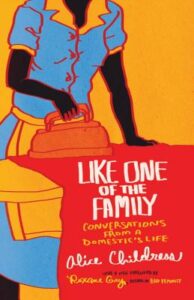
Alice Childress, Like One of the Family: Conversations from a Domestic’s Life
This novel, framed as a set of conversations between two black women domestic workers, was initially published as serial installments in Paul Robeson’s newspaper. Monologic and fizzy—Alice Childress was also one of our greatest playwrights—these confessions illustrate daily toil from a most personal perch.
Partially fun fact? This book also inspired a text we needn’t dwell on here: Kathryn Stockett’s The Help.
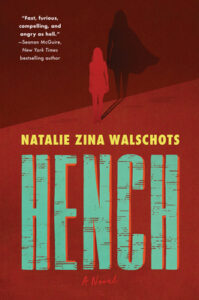
Natalie Zina Walschots, Hench
My colleague Drew Broussard recommends this twisty thriller, which follows a livid data analyst down a dark rabbit hole—right into a world of supervillains and their right hand helpmates. Through our winsome protagonist, Walschots circles big questions. When does temp work turn evil? And what can the lowly worker do with her wrath?
For all its bleak comedy, this book has also been praised for its frank look at disability in the workplace.
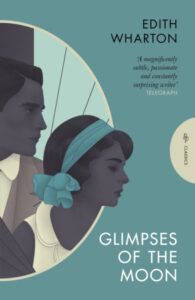
Edith Wharton, Glimpses of the Moon
This whimsical Wharton novella follows two hangers-on with high society aspirations who work out a couch-surfing scheme so they can leverage their starter marriage into greener pastures. In addition to starring Wharton’s perfect prose, this is one of few novels to offer practical (albeit unhinged) marching orders for those who would exit the treadmill. Who needs work if you have friends with beachfront property?
And if a classic isn’t your jam at the moment, fear not. Last year, Tavi Gevinson and Sam Freilich penned and produced a modern spin on this story as an Audible original.
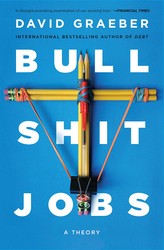
David Graeber, Bullshit Jobs
The late anthropologist David Graeber left behind a trove of capital-critical indictments. In this touchstone and arguably self-explanatory text, he theorizes that meaningless work levies a social and spiritual tax.
This one pairs nicely with two other intellectual histories. Hannah Proctor’s Burnout, and Sarah Jaffe’s Work Won’t Love You Back: How Devotion to Our Jobs Keeps us Exhausted, Exploited, and Alone.
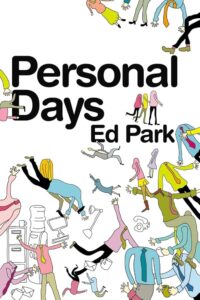
Ed Park, Personal Days
I’ve been enjoying Ed Park’s recent kaleidoscopic meditation, Same Bed, Different Dreams. In this earlier work, we find another fever dream. This novel “set in a midsize metropolitan office,” captures the collective consciousness of a hive of worker bees via a plural narrator.
Called Kafka-esque on its debut—and often compared to Joshua Ferris’ Then We Came to the End—this witty satire also captures the absurdities of modern office life.
